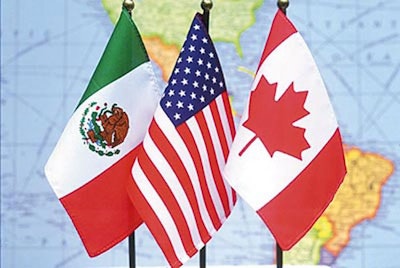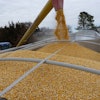
According to a report from the U.S. Grains Council, despite frustration related to the March 1 announcement of likely tariffs on imports of steel and aluminum to the United States, negotiators made substantial technical progress in several chapters and annexes during the seventh formal round of negotiations on the modernization of the North American Free Trade Agreement (NAFTA), held in Mexico City from Feb. 25 to March 4.
“In addition to the continued general positive tone, there were indications negotiations may be able to continue on an informal basis,” says Floyd Gaibler, U.S. Grains Council (USGC) director of trade policy and biotechnology, who attended the round. “However, there is now additional uncertainty injected into the negotiations with President Trump’s intentions to impose steel and aluminum tariffs that could affect both Mexico and Canada.”
Negotiators closed the chapter on good regulatory practices, the sixth chapter to be completed. The new language promotes greater regulatory compatibility on issues impacting biotechnology authorizations and maximum residue levels (MRLs) for pesticides used on fruits and vegetables.
Negotiations have also finished on the sanitary-phytosanitary (SPS) measures chapter, expanding the original NAFTA text to include a fully-enforceable draft chapter similar to that in the Trans-Pacific Partnership (TPP) text. Improvements include language committing import checks to be based on actual potential risk; encouraging cooperative technical consultations to work for science-based solutions to SPS matters; and requiring parties to inform exporters or importers within a specified time frame if a shipment is being prohibited or restricted entry for a reason related to food safety or animal or plant health.
The chapter on technical barriers to trade and text related to biotechnology are also close to completion. Rules on biotech approvals are expected to go beyond TPP text, including transparency measures, established procedures for detection of trace amounts of unauthorized biotech traits in shipments, and creation of a working group on biotech trade issues.
“U.S. and Canadian agriculture groups had identified biotech approvals as an area ripe for modernization,” Gaibler says. “The language will also acknowledge the importance of recognizing new plant breeding techniques and the need for cooperation in how these new technologies will be regulated.”
All three countries also agreed to establish a formal energy chapter, including encouraging robust North American trade in biofuels by promoting regulatory compatibility for fuel blending requirements through policy and technical exchanges.
“New guidance on energy cooperation could be beneficial in the council’s broad efforts to promote the use of ethanol with both Mexico and Canada,” Gaibler says. “However, other issues in the agriculture chapter remain sensitive and unresolved, as do trade remedy issues.”
All three countries are actively engaged on the agriculture market access for goods chapter, but little progress was made. Additionally, the seasonality provisions continue to be a non-starter for the Mexican government. There is a general view that talks will bog down and lose momentum unless the United States begins to show some flexibility on these and other “rebalancing” issues proposed by the Trump Administration.
In addition to participating in negotiations with the U.S. Department of Agriculture (USDA) and U.S. Trade Representative (USTR), the council participated in meetings with government officials from all three countries as well as a Farmers For Free Trade media briefing with the Mexican press.
“The daily engagement with members of the Mexican grain trade and livestock sector are among our closest global relationships,” says Ryan LeGrand, USGC director in Mexico, who participated in the briefing. “We want to preserve these partnerships and the world’s most efficient interregional grain and livestock value chain.”
The council will continue outreach efforts with Mexico’s USDA-equivalent, SAGARPA, Agriculture and Agri-Food Canada and industry representatives from the Mexican and Canadian livestock, agri-food trade and food and consumer products sectors.
The next formal round of negotiations is tentatively scheduled to start the week of April 8 in Washington, D.C., with negotiators continuing to exchange information and conduct intersessional negotiations in the meantime.





















